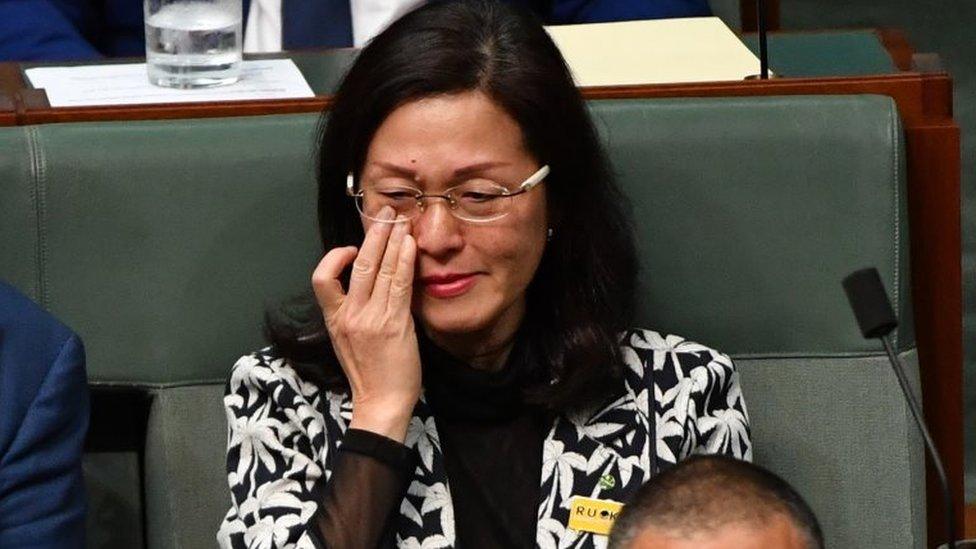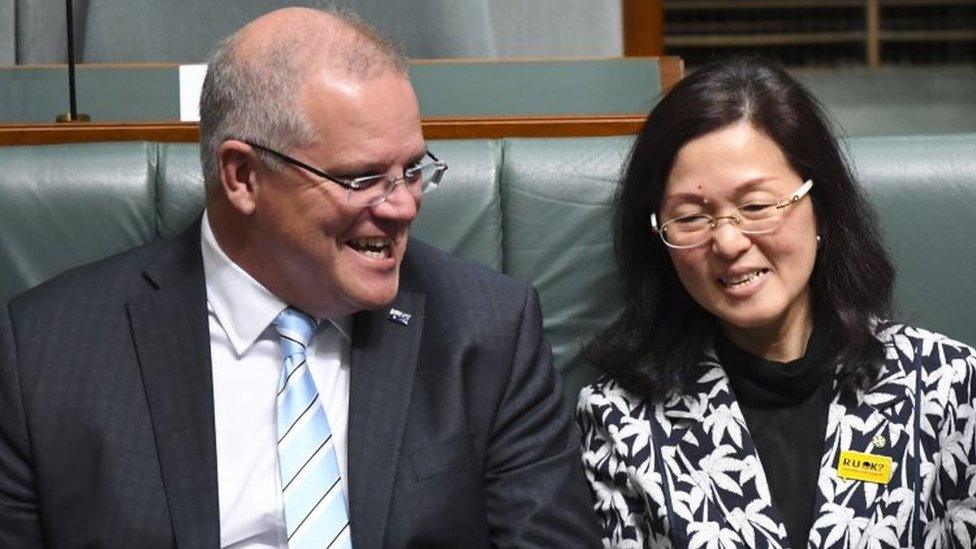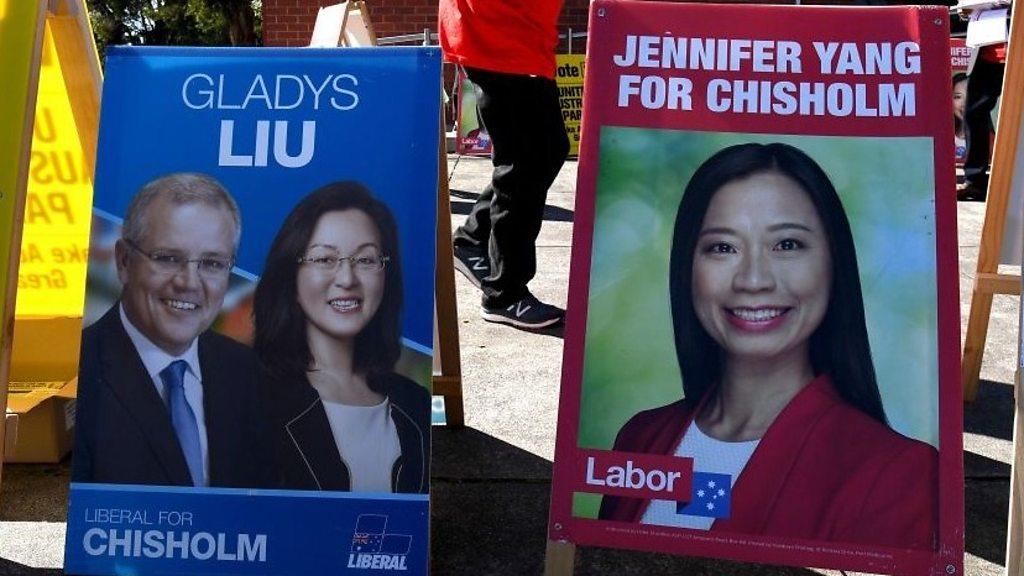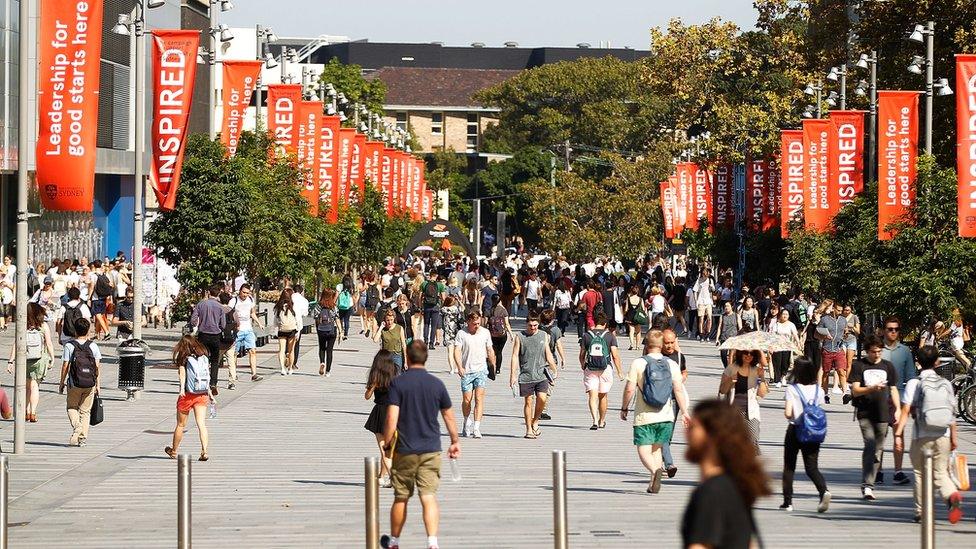Gladys Liu: The row over a trailblazing Chinese-Australian MP
- Published

Gladys Liu has been heavily scrutinised by political opponents, and was reduced to tears last week
As Australia increasingly debates China's influence on its society, a new MP is facing damaging questions over her past links to Beijing-associated groups. Others, however, dismiss the controversy as "xenophobic paranoia". The BBC's Phil Mercer reports from Sydney.
Gladys Liu would have known her new job in Canberra would at times be brutal and expose her to unprecedented scrutiny.
But the first Chinese-Australian to sit in the often uproarious House of Representatives has been reduced to tears by a sustained attack by her political enemies for failing to disclose her membership of organisations linked to China's Communist Party.
Senior government colleagues have had to fend off suggestions Ms Liu was a "traitor". Australia's Attorney-General Christian Porter said criticism of the Liberal MP - elected in the marginal Victorian seat of Chisholm in May - had been shameful.
But there are potentially explosive claims that Ms Liu had connections with senior figures in Beijing's covert political propaganda apparatus - which have raised questions about her eligibility to sit in parliament.
'I am a proud Australian'
The Australian Broadcasting Corporation reported Ms Liu was a council member of the Guangdong provincial chapter of the China Overseas Exchange Association - which at the time was part of China's powerful State Council, the Chinese government's central political and administrative body.
Experts believe it is a key link between the Chinese government and pro-Beijing nationalists based in other countries.
Ms Liu later confirmed she was an honorary member of the association between 2003 and 2015, but has strongly denied any divided loyalties.
At issue here is whether these relationships were about networking and introductions to the rich and powerful for a woman who was a prolific fundraiser for the Liberal Party, or something more sinister.
How Gladys Liu won a historic contest in Australia's election in May
Ms Liu, who was born in Hong Kong and won a scholarship to study speech therapy in Melbourne in 1985, has insisted her past affiliations were innocent. She added that some Chinese associations had appointed her to honorary positions without her permission.
"I have resigned from many organisations and I am in the process of auditing any organisations who may have added me as a member without my knowledge or consent," Ms Liu said in a statement.
"I am a proud Australian, passionately committed to serving the people of Chisholm, and any suggestion contrary to this is deeply offensive."
The Labor opposition has called on Ms Liu to give a more detailed explanation in parliament.
But Australia's centre-right Prime Minister Scott Morrison, Ms Liu's party leader, said the new backbencher was the victim of a "smear" campaign with a "grubby undertone".
"Gladys is a Chinese-born Australian. Does that make her in cahoots with the Chinese government? Of course not," Mr Morrison said. "It is a ridiculous suggestion and I think it is an insult to every single Chinese-Australian in this country."

You may also be interested in:

A disastrous interview on Australian television has done little to ease the pressure on the fledgling politician, who told Sky News Australia she couldn't remember her past links with various organisations and seemed uncertain when pressed on her attitudes to China. She later tried to set the record straight and clarify past memberships.

Prime Minister Scott Morrison says Ms Liu is the victim of a "smear" campaign
The political assault on Ms Liu has been orchestrated by the opposition Labor Party. It has smelt political blood, and has demanded to know if the government had received warnings about her from Australia's spy agencies.
"There have been questions raised for some time about whether Ms Liu is a fit and proper person to be in the Australian parliament," said Labor's foreign affairs spokeswoman Penny Wong.
Labor Senator Kimberley Kitching said Gladys Liu was "a walking time bomb" for the Liberal Party, and hinted that more revelations about her past would emerge. If they do, the chess-loving Victorian MP could find herself boxed in and facing checkmate.
Australia's growing China debate
Ms Liu became an Australian citizen in 1992. Her parliamentary career has collided with growing anxiety in Australia over allegations of Chinese meddling in its domestic politics and cyber espionage. A taskforce is to investigate foreign interference in its universities because of fears over China's growing influence on campuses.
On Monday, the Reuters news agency reported that China was behind a cyber attack on Australia's parliament earlier this year. The Australian government declined to comment on the report, which cited five anonymous sources.
Is China influencing Australian universities and politics?
An official corruption inquiry in Sydney is examining allegations a Chinese billionaire gave an illegal donation of A$100,000 (£55,000; $70,000) in cash stuffed into a shopping bag to Labor's New South Wales branch. Huang Xiangmo has strenuously denied the accusation. In 2017, a high-profile Labor senator, Sam Dastyari, was forced to quit in disgrace over his links to Mr Huang.
China's influence on Australia grows by the day; from migration to tourism, education, and trade. The relationship has under-pinned Australia's recent prosperity - 40% of Australia's exports go to China - but it is does have a darker side, according to James Laurenceson, from the Australia-China Relations Institute at the University of Technology Sydney.
"Some of China's behaviour is an unacceptable encroachment on Australian interests and sovereignty. The Chinese Communist Party would indeed like to rally the Chinese diaspora in Australia to support their cause," he told the BBC.
'Ugly paranoia'
As with previous debates about foreign influence in Australia, some have questioned whether Ms Liu's case is down to anti-China hysteria.
"If Ms Liu was a white, blonde haired, blue eyed, Anglo-Celtic woman, rather than an Australian of ethnic Chinese background, would she be facing the treatment that she has had to tolerate in the last week? I doubt it," a former government minister, Christopher Pyne, wrote in a newspaper opinion piece, external.
"There is an ugly strain of xenophobic paranoia running through this story."
Mr Laurenceson said he believes the attacks on Ms Liu's integrity and loyalty are misplaced.
"To be clear, no evidence has been presented that she tried to alter Australian government policy on behalf of the Chinese Communist Party, much less that she was successful at doing so," he said.
"Just a month or so ago she voiced her support for the anti-government protesters in Hong Kong. Why aren't her critics acknowledging that?"
- Published17 May 2019

- Published28 August 2019

- Published31 July 2019
